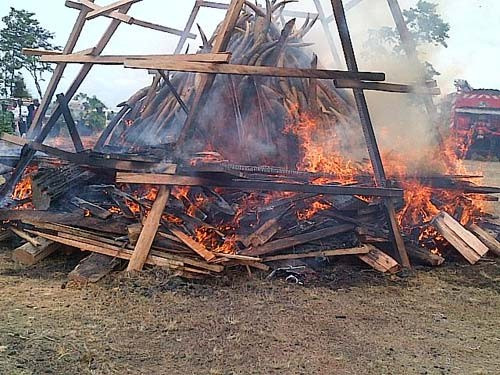Gabon Burns Huge Elephant Ivory Stockpiles In Message to Poachers and Black Market
WWF and Traffic voice support as president Ali Baba lit a pyre of more than 4,000 Kilos of Ivory blocked from illegal trade in Asia.

Gabon has symobolically burnt its government held stockpile of ivory in a pointed message to elephant poachers.
Poaching levels have surged across Africa to supply the strong black market for ivory in Asia, with the Gabon stockpile alone weighing in at 4,825 kilos and representing some 850 dead elephants.
Gabon is the first country in its West African neighbourhood to publically destroy its ivory, with president Ali Bongo lighting the pyre.
The move was supported by conservation groups WWF and Traffic.
"If not managed properly, ivory stockpiles in the hands of governments suddenly 'get legs' and move into illegal trade," said Tom Milliken, ivory trade expert for Traffic.
"Gabon's actions effectively keep the ivory out of the way of temptation."
Willdlife groups reported that Zambia lost three metric tonnes of ivory from government storage in early June, while Mozambique lost 1.1 metric tonnes stolen in February.

"WWF supports Gabon's decision and sees the move as an indication of the country's commitment to curbing elephant poaching and the illegal ivory trade," said Stefanie Conrad, of the WWF Central Africa Regional Programme Office.
"Ivory of illegal or unknown origin cannot be sold legally internationally for commercial purposes. Gabon has acted commendably in deciding to put such ivory beyond use."
The appetite for ivory in Asia appears insatiable, while a black market for rhino horn is also thriving. As many as 250 rhinos having been killed by poachers in South Africa alone this year.
"We need to break the illegal ivory trade chain," said Suparna Biswas, Country Director of WWF Gabon. "This time the decision has come from the top and should be an example to others. Many Central Africa ministries still proudly display pieces of worked ivory in their offices. Many government officials are implicated in illicit ivory trafficking. This must end."
The ivory is often used in medicines and poultices for which there is no scientific approval.
The battle against the increasingly organised black market has led to conservation groups taking occasionally drastic action, even going so far as to inject poison into rhino horns.
A record number of ivory seizures were made in 2011, but elephant massacres continue to take place across Africa.
© Copyright IBTimes 2025. All rights reserved.





















